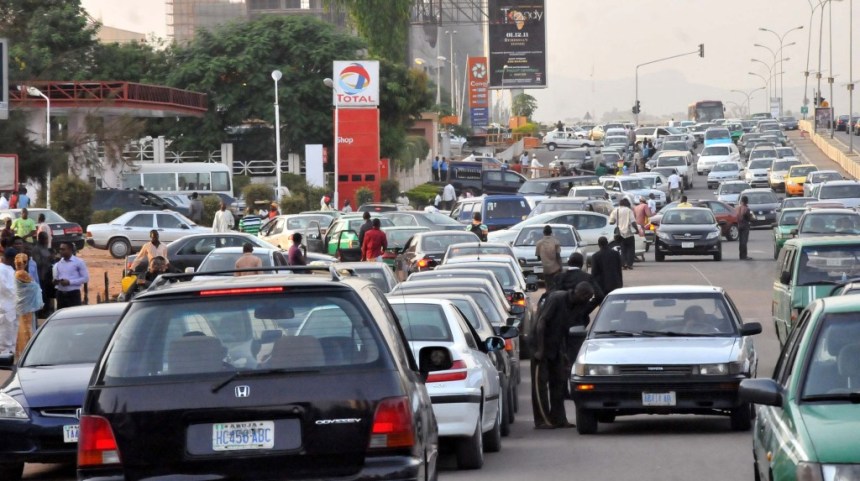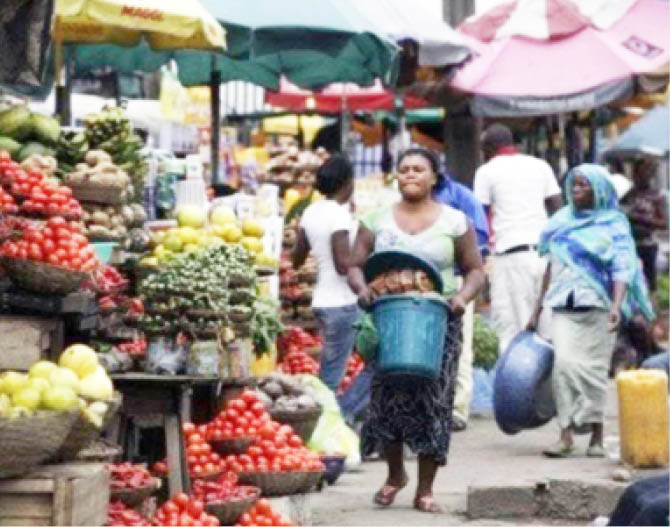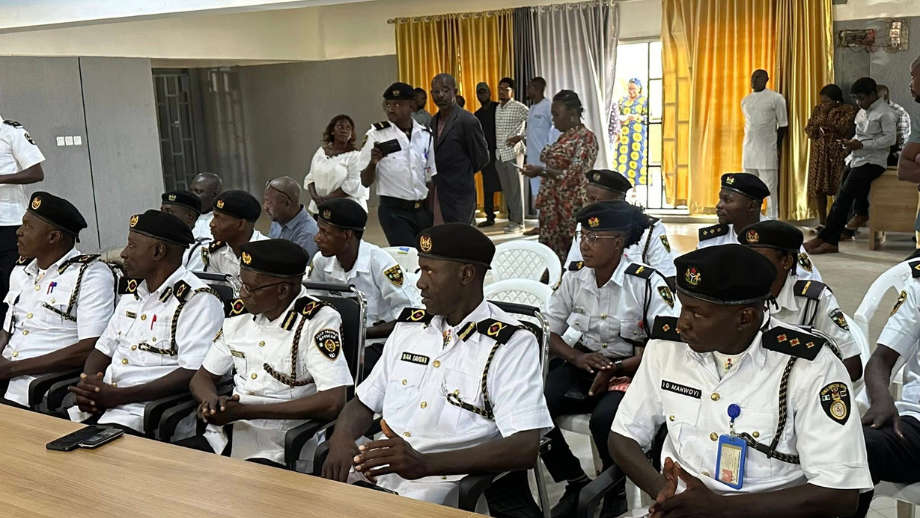Business
Fuel scarcity, long queues worsen in Abuja, Oyo, spread to Ogun, Osun

- Petrol sells for N200/litre
- Panic buying in Lagos
Fuel scarcity, which started in Abuja and parts of Oyo State some weeks ago, has spread to a number of areas in the South-West region including Ogun and Osun states as major filling stations have either shut down or are experiencing long queues of buyers.
There was also panic-buying in some parts of Lagos, Nigeria’s commercial capital, as long queues were observed in a number of filling stations in Ikotun, Ejigbo, Mushin, Yaba and Ojota, among others.
The scarcity arising from the increase in cost of diesel which the tankers rely on for transportation of petroleum products has resulted in an increase in pump price of the products to between N180 and N200 per litre in Ogun.
While the major marketers are still selling for the approved pump price of N165 per litre, with their attendants asking motorists to part with N100 for every purchase, the independent marketers are selling between N180 and N200.
There are noticeable queues in some of the fuel stations operated by the major marketers, such was absent in those stations owned by the independent marketers.
Apparently, people are trying to avoid buying where they would pay more and would rather join the long queue unless it was in a situation where they could not help.
Not much of a long queue was observed in some parts of Abeokuta but was gathered that there were queues in Sagamu, Ilisan, Ijebu Ode, among others.
The NNPC mega station at Oke Mosan area of Abeokuta was reported not to have dispensed fuel from Thursday to Saturday that our Correspondent visited the station.
The Fatgbems filling station, located directly opposite the NNPC mega station, was not dispensing fuel when our correspondent visited the station in the early hours of Saturday.
Also in Sango-Ota, Ogun State, some filling stations had long queues while others were not selling fuel.
There was also a report of fuel scarcity in Ile-Ife but the scarcity was barely visible on Sunday. Some filling stations were seen dispensing fuel to motorists while some did not open their stations.
Some dependent marketers who have PMS such as NNPC, MOBIL, TOTAL, TEXACO and BOVAS filing stations were selling fuel to customers. No queue was noticed yesterday in most of the filing stations that were seen selling petroleum motor spirit to their customers.
Some of the independent marketers have closed their filling stations for lack of fuel while some were also seen dispensing PMS to motorists.
The fuel scarcity had not been absolutely affecting the town as some of the filing stations had PMS were selling it at stated price of N165 per litre. Though some Independent marketers were on Friday selling PMS between N180 to N200 per litre before reverting to official price of N165 per litre.
Long queues were spotted earlier in parts of Abuja, causing motorists to hike fare amidst gridlock occasioned by the scarcity on the Nyanya-Keffi expressway.
The Chairman of the South-West zone of the Independent Petroleum Marketers Association of Nigeria (IPMAN), Dele Tajudeen, said that the association might direct its members in the zone to increase the pump prices of petrol as well as diesel if the appropriate regulatory agency failed to address the continuous non-supply of the products to its members.
He said members of IPMAN in his chapter had been unable to access supplies of the products from any of the six government-owned depots for the past six months.
Business
Inflation Slows to 15.10% as Food Prices Eased in January

Inflation Slows to 15.10% as Food Prices Eased in January
Nigeria’s inflation rate recorded a marginal decline to 15.10 per cent in January 2026, signalling a slight moderation in consumer prices at the start of the year.
Latest data released on Monday by the National Bureau of Statistics (NBS) showed that headline inflation dipped from 15.15 per cent in December 2025, reflecting a 0.05 percentage point decrease.
The NBS, in its January Consumer Price Index (CPI) report, also revealed that food inflation — a key driver of household spending pressures — eased significantly to 8.89 per cent in January, down from 10.84 per cent recorded in December.
According to the bureau, the CPI dropped to 127.4 points in January from 131.2 points in the preceding month, representing a 3.8-point decline.
On a month-on-month basis, inflation fell sharply to -2.88 per cent in January, compared to 0.54 per cent in December — a 3.42 percentage point swing.
This indicates that the average price level not only slowed but contracted within the month under review.
“The Consumer Price Index (CPI) declined to 127.4 in January 2026, reflecting a 3.8-point decrease from the preceding month (131.2),” the NBS stated.
It added, “In January 2026, the headline inflation rate eased to 15.10%, down from 15.15% in December 2025.
“On a month-on-month basis, the headline inflation rate in January 2026 was -2.88%, which was 3.42% lower than the rate recorded in December 2025 (0.54%).”
The moderation in both headline and food inflation may offer cautious optimism for households and policymakers, particularly amid ongoing economic reforms and cost-of-living concerns.
However, analysts note that while the decline suggests easing price pressures, the overall inflation rate remains elevated, keeping purchasing power under strain.
Auto
Appeal Court Ruling on VIO Limited to Abuja, Not Lagos — LASG

Appeal Court Ruling on VIO Limited to Abuja, Not Lagos — LASG
The Lagos State Government has dismissed widespread claims that a recent Court of Appeal judgment has stripped Vehicle Inspection Officers (VIOs) of their powers across Nigeria, insisting that the ruling applies strictly to the Federal Capital Territory (FCT).
The clarification follows public reactions to a decision of the Court of Appeal, Abuja Division, which upheld an earlier ruling of the Federal High Court restraining Vehicle Inspection Officers and the Directorate of Road Traffic Services in the FCT from stopping motorists, impounding vehicles, or imposing fines.
The judgment triggered viral interpretations suggesting that VIO operations had been outlawed nationwide.
However, Lagos State Attorney-General and Commissioner for Justice, Lawal Pedro, SAN, described such interpretations as legally inaccurate and misleading.
Basis of the Court Decision
According to Pedro, both the Federal High Court and the Court of Appeal premised their decisions on the absence of statutory authority empowering VIO officials in the FCT to stop, impound, confiscate vehicles, or impose fines on motorists.
READ ALSO:
- Terror in Lagos Traffic: Cutlass Gang Unleashes Mayhem on Mile 12–Ketu Road
- FG Drags El-Rufai to Court Over Alleged NSA Phone Interception
- Mystery in Lekki: Police Probe Death of Two Nollywood Crew Found Lifeless in Parked Car
“It is important to understand that the Honourable Judge of the Federal High Court and Justices of the Court of Appeal premised their decision on absence of statutory power conferred on the Respondents to stop, impound or confiscate vehicles and/or impose fines on motorists on roads in FCT Abuja,” he stated.
He noted that the courts did not declare vehicle inspection enforcement unconstitutional in Nigeria, but rather ruled specifically on the legal framework governing the FCT authorities involved in the suit.
Why Lagos Is Different
The Lagos government stressed that Nigeria’s federal structure allows states to legislate on residual matters such as road traffic management and vehicle inspection.
Pedro explained that Lagos operates under the Lagos State Transport Sector Reform Law, which expressly establishes and empowers the Vehicle Inspection Service (VIS).
Section 12(1) of the law authorises the VIS to:
Inspect and regulate the roadworthiness of vehicles
Conduct pre-registration inspections
Issue Road Worthiness Certificates
Collaborate with other relevant agencies to enforce traffic laws
In addition, Section 23(1) provides for penalties against offenders, subject to adjudication before mobile or magistrate courts, ensuring judicial oversight.
Not of Nationwide Effect
While acknowledging that the appellate decision is binding within the FCT, the Lagos government emphasised that it does not have automatic nationwide application.
“The judgment, though binding, is not of general application or of nationwide effect in Nigeria,” the ministry stated.
The state government stressed that VIS officers in Lagos remain legally empowered to carry out enforcement duties under extant state laws.
Wider Implications
The controversy underscores ongoing debates over traffic enforcement powers in Nigeria, particularly the constitutional boundaries between federal and state authorities.
Legal analysts note that unless the Supreme Court delivers a broader pronouncement on the issue, enforcement powers will continue to depend largely on the specific statutory framework establishing such agencies in each jurisdiction.
For now, Lagos authorities insist that vehicle inspection and traffic enforcement operations in the state remain valid and legally grounded.

Appeal Court Ruling on VIO Limited to Abuja, Not Lagos — LASG
Auto
Chanrai Storms Nigeria’s Gas Market, Unveils High-Capacity CNG, LNG Solutions to Power Energy Shift

Chanrai Storms Nigeria’s Gas Market, Unveils High-Capacity CNG, LNG Solutions to Power Energy Shift
By Rasheed Bisiriyu
Nigeria’s drive towards cleaner and more affordable transport fuel gathered fresh momentum on Friday as Chanrai Nigeria Limited formally entered the country’s gas distribution space, unveiling high-capacity CNG and LNG compression technologies in Lagos.
The company, a member of the globally diversified Kewalram Chanrai Group, announced a strategic partnership with India’s Tulip Compression to roll out advanced compressor packages and integrated “single window” CNG solutions aimed at accelerating the Federal Government’s Presidential CNG Initiative.
Chief Operating Officer of Chanrai Nigeria Limited, Anil Sahgal, described the Tulip CNG Compressor Packages as a “game-changer” for Nigeria’s evolving energy landscape.
“With our commitment to safety, efficiency and OEM-grade partnership, we’re empowering the nation to achieve its CNG ambitions while driving economic growth and environmental sustainability,” Sahgal said.
The move marks Chanrai’s expansion beyond its traditional business interests — which span automobiles, agro-products, healthcare and fast-moving consumer goods — into the fast-growing gas infrastructure segment, as fleet operators and industrial users increasingly seek alternatives to petrol and diesel.
Under the partnership, Chanrai Nigeria and Tulip Compression will deliver Compression Station on Single Window (CssW) solutions — integrating compressors, dispensers, storage and stainless-steel tubing under one brand — to simplify deployment and reduce installation timelines.
The compressor packages come in a wide capacity range, from 250 to 4,500 standard cubic metres per hour, making them suitable for small refuelling stations as well as large gas hubs.
A 1,400 SCMH gas engine-driven booster compressor is designed to refuel heavy-duty CNG trucks in about 20 minutes by drawing gas from tube trailers.
The systems are available in both electric motor-driven and gas engine-driven configurations, eliminating the need for large gas generators while ensuring energy efficiency and lower life-cycle costs.
According to the company, the equipment features dual-chamber leak-proof safety systems, advanced sealing technology to eliminate gas loss and global certifications including ATEX, CE, BIS and SGS standards.
The unveiling underscores the growing private sector response to government reforms encouraging gas adoption as a cost-effective and environmentally friendly alternative fuel.
With the compressor packages now available for immediate orders, Chanrai Nigeria said it would provide 24/7 after-sales support, operations and maintenance services, as well as remote asset monitoring solutions.
The development signals intensifying investment in CNG infrastructure as Nigeria seeks to deepen local gas utilisation, reduce fuel import dependence and cushion consumers from volatile petrol prices.
-

 Education1 day ago
Education1 day agoCheck Your Name: UNILORIN Releases Updated NELFUND Refund List for 2024/2025 Students
-

 News1 day ago
News1 day agoOsogbo Sons and Daughters Mark 5th Anniversary with Awards, Political Undertones
-

 metro2 days ago
metro2 days agoWoman Arrested Over Murder of Nigerian E-Hailing Driver in South Africa
-

 metro9 hours ago
metro9 hours agoUS Freezes Assets of Eight Nigerians Over Boko Haram, ISIL, Cybercrime Links
-

 News2 days ago
News2 days agoAfenifere Calls for Immediate Take-Off of State Police as Terror Threats Rise in Yorubaland
-

 metro2 days ago
metro2 days agoBoko Haram Terrorists Release Video of 176 Abducted Kwara Residents
-

 metro2 days ago
metro2 days agoUS Military Boosts Support for Nigeria’s Fight Against Insurgency With Ammunition, Troop
-

 metro10 hours ago
metro10 hours agoTerror in Lagos Traffic: Cutlass Gang Unleashes Mayhem on Mile 12–Ketu Road











